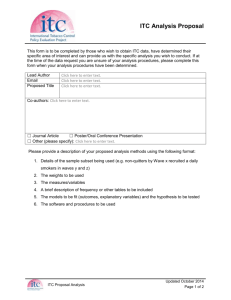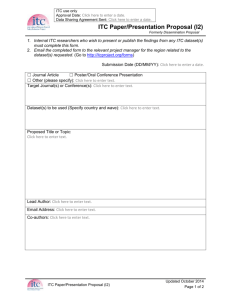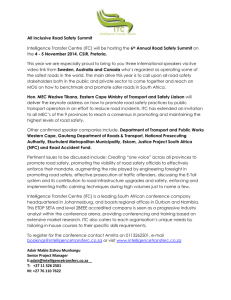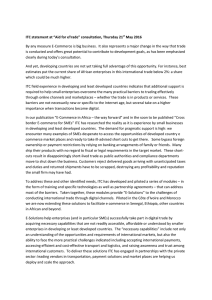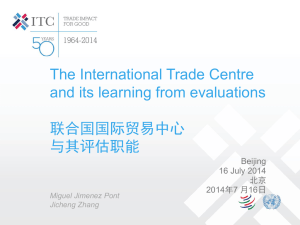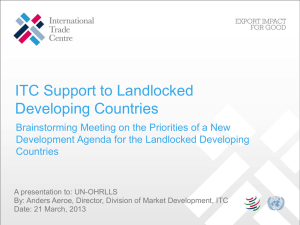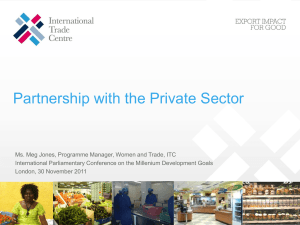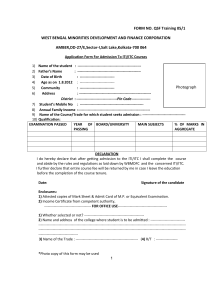ITC TALKING POINTS ON TRADE IN SERVICES PREPARED FOR ITC
advertisement
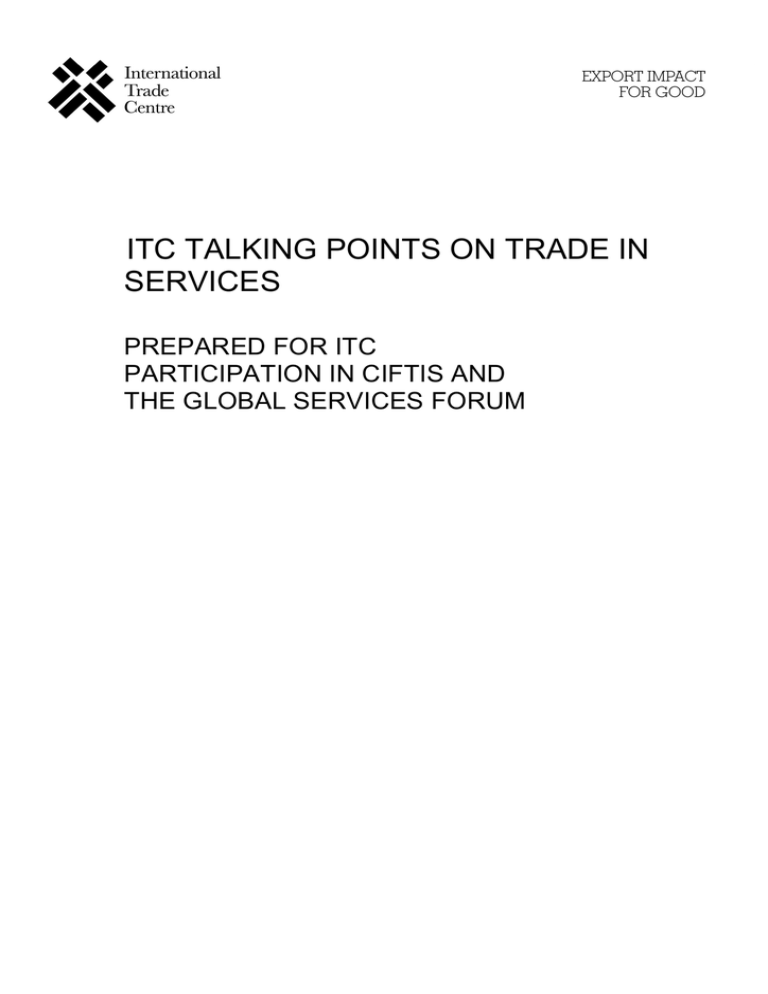
ITC TALKING POINTS ON TRADE IN SERVICES PREPARED FOR ITC PARTICIPATION IN CIFTIS AND THE GLOBAL SERVICES FORUM ITC Talking Points on Trade in Services The designations employed and the presentation of material in this document do not imply the expression of any opinion whatsoever on the part of the International Trade Centre concerning the legal status of any country, territory, city or area or of its authorities, or concerning the delimitation of its frontiers or boundaries. This document has not formally been edited by the International Trade Centre. ii ITC Talking Points on Trade in Services Contents 1. Trade in services can be a game changer for development ................................................................. 1 1.1. First, one can make a clear macro-economic rationale using three basic facts: ........................ 1 1.2. Second, there are a number of underlying economic and business drivers which can contribute to a growing role in services trade for developing countries. ..................................... 1 1.3. Third, more and more development studies, cross-cutting or country based, show evidence of success stories for developing countries in international services trading. ................................ 2 2. What are the challenges for developing countries desiring to enter international services market? .... 2 2.1. First and most naturally, create a competitive location and a conducive business environment 2 2.2. The second challenge is to build efficient export-promotion architecture for services. ............... 3 2.3. Third challenge: grabbing opportunities of trade in services often raises high transaction costs for SMEs. .................................................................................................................................... 3 3. So what is it that ITC can do to help developing countries confront these challenges? ....................... 3 3.1. Building awareness and information tools for the services industries. ....................................... 4 3.2. Building constituencies and public-private dialogue to improve national policy frameworks. ..... 4 3.3. Collect, benchmark and develop best practices in services promotion from Trade Promotion Organizations. ............................................................................................................................. 4 3.4. Direct promotion of services export through support to companies and sectors. ....................... 5 iii ITC Talking Points on Trade in Services 1. Trade in services can be a game changer for development In ITC we are convinced that trade in services represents a huge and game-changing opportunity for developing countries including the most vulnerable of them which represent our core beneficiaries. Why? 1.1. First, one can make a clear macro-economic rationale using three basic facts: • The share of services in GDP is disproportionately higher than the share of goods in world trade. Services contribute to70% of world GDP (WTO ) but make up less than 25% of global exports as currently measured by the OECD/WTO Database on Services Value-Added launched in January 2013. There is an important potential for the growth in the amount exported through “internationalisation”. • More and more evidence from Global Value Chain (GVC) analysis shows that the role of services in international trade is greatly underestimated in statistics. The emergence of Global Value Chains reveals the close link between services and the creation of value in the exchange of intermediary products. The trade in value-added data recently developed by the OECD and the suggests that the value of trade in services, when taken from a value added perspective, may be approaching half of world trade exports (45%). • The share of services both in GDP and in exports tends to increase with the level of development though we see (as noted later) that this does not have to be linear. Observing that the developing countries only account for 30% of world services exports today, and the growth predicted, the potential for growth is far from being exhausted; 1.2. Second, there are a number of underlying economic and business drivers which can contribute to a growing role in services trade for developing countries. • The ICT revolution allows to trade what was not tradable before: in more and more activities ITC allows separation of where services (whether to consumers or as part of goods value chain) are 1produced and where they are consumed, thus introducing the possibility of time and distance between both; ICT allows easy and low cost storage and transfer of huge amounts of data enabling services. These possibilities impact more and more services sector, including those traditionally defined as “non-tradable” such as health care. The new mode 1 (cross-border trade) export opportunities for services outsourcing locations are enormous. • Business strategies of multinational over the last 20 to 30 years have tended to focus on corebusiness activities and consequently outsource non-core activities, often services, in particular Business-Processes and this trend is predicted to continue to grow and to increasingly also come from SMEs. • International Investment Strategies have tended over the same period to optimize costs by fragmenting and offshoring activities to lower-cost territories. And we know that this trend is expected to increase considering that FDI levels have not yet recovered from pre-crisis levels and MNCs are holding significant resources waiting for investment opportunities. According to the UNCTAD World Investment Report 2012, FDI in the services sector rose by 15% in 2011 after failing sharply in 2009 and 2010. In 2012, FDI in the services sector reach some 570 billion. In SubSaharan Africa, the emergence of a middle class is fostering growth of FDI in the services such as banking, retail, and telecommunication services. • Innovation strategies also tend to promote trade in services: it is well known for instance that innovation is strongly stimulated where enterprises and other institutions working in the same sectors cluster group together in clusters. This has encouraged the birth of world centres of excellence specialised in selected services, in particular IT, focusing on global exports. 1 ITC Talking Points on Trade in Services 1.3. Third, more and more development studies, cross-cutting or country based, show evidence of success stories for developing countries in international services trading. At an aggregated level, some World Bank findings indicate that developing countries are shifting towards services sooner, and at a lower level of per capita income, than has been the case in the traditional development trajectory. This suggests that services could provide an alternative engine of growth, enabling some latecomers to development to “leapfrog” what has been seen as the traditional manufacturing route to development. Of particular interest is that the contribution to growth generated by services exports is especially strong for low-income countries and well above world average. • One of the main new development implications is that the emergence of services and the increased fragmentation of the global value chains (into “tasks”) have the potential to substantially rebalance the “old economy” distribution of comparative advantages based on natural endowments of developing countries. - First it is possible for countries to ‘create’ a competitive advantage in a service task, potentially overcoming the traditional obstacles of smallness, remoteness and landlockedness, thanks to possibilities opened by ICT : for traditionally disadvantaged countries (landlocked, distant insular location…), the possession of a high-speed network may effectively bridge the tyranny of distance. - Second, developing countries can tap into other sources of comparative advantage such as cultural, linguistic and educational factors, needed to grab opportunities from BPO. Zooming even more closely to the private sector development dimension, one can see that the fragmentation of production in global value-chains and ICT among other elements may multiply opportunities for SMEs to participate in the global economy by reducing the threshold and capital necessary to enter markets for intermediate goods and services (tasks). Therefore the business and development literature report many success stories based on developing countries scaling-up their involvement in international services trade through integrating into GVCs. A wellknown case for instance is Intel investment in Costa-Rica. Starting from relatively low-value added industrial component production, the business has evolved to become a worldwide Center for Research and Development. More broadly India, the Philippines, Malaysia, Kenya, Uganda are already well-known success stories in BPO and IT exports. 2. What are the challenges for developing countries desiring to enter international services market? 2.1. First and most naturally, create a competitive location and a conducive business environment These are pre-requisites to attract the investment, both foreign and domestic, that plays a decisive role in building high performing export-oriented services clusters. Here are some basic ingredients of competitiveness specifically tailored to services: Some elements of this are generic to FDI attraction but have a peculiar importance for export performance in services: • Availability of Human Capital and adequate skills (services are more skills-intensive than other sectors); • Quality of Institutions and rule of law • Protection and development of Intangible Assets (i.e corporate intellectual property such as copyright, business methodologies and brands) and a supportive environment for services Innovation for Export • Enabling Digital Infrastructure, in particular ability to connect outward Some other factors more specifically determine the potential for growth in services export, in particular the regulatory environment. 2 TITLE • Movement of persons: services firms need flexibility to be able to innovate on a by project basis by moving people and ideas around quickly; virtual teamwork and cross-border collaboration can be important. • Efficiency of Domestic Regulation: this includes rigidity or other inefficiencies in employment laws (human capital costs are often 70-80 percent of total cost), burdensomeness of regulatory compliance costs (licensing, certification) , access to procurement opportunities • Efficiency of international agreements: investment regimes, technical interoperability, mutual recognition and global standards conformity and assurance all influence countries’ capacities to access outsourcing opportunities. • Targeted policies to build centres or hubs of excellence in services. The recent World Bank study on developing country services exports notes that it has become quite common practice for governments to opt for the creation of software and high-tech parks, in which export-oriented firms benefit from dedicated infrastructure and streamlined administration. In essence, these are the services equivalent of the Export Processing Zones created for the goods sector. Such services parks similarly aim at solving the infrastructural and regulatory bottlenecks that the rest of the economy struggles with. The evidence is that investors respond positively to the heightened transparency and predictability of the regulatory environment inside the “park”. 2.2. The second challenge is to build efficient export-promotion architecture for services. Traditional export-promotion operationalized through TPOs are often goods oriented usually not-well equipped, not to say uncomfortable in dealing with and efficiently supporting services companies. There are several reasons for this: • Trade in services involves more complex sets of buyers-sellers interactions than goods: mode 3 (investment for commercial presence) and mode 4 (movement of natural persons) contribute directly to export performance; export performance is also directly dependent on capacity to stimulate clustering of enterprises, attract FDI and support innovation. • Trade in services presents more difficulties in terms of access to statistical and regulatory information : trade data is much more difficult to collect given much of the trade is intangible and the full range of domestic policies and regulations which often affect services more than trade policy are difficult to catalogue and communicate. • Constituencies are often more fragmented in services sectors and representative institutions weaker than in goods, thus diluting their lobbying capacity and impact. However, the World Bank work suggests that services business groups (such as NASSCOM in India and the BPO Association in the Philippines) play a positive role in the development of services policy. 2.3. Third challenge: grabbing opportunities of trade in services often raises high transaction costs for SMEs. Access to information is obviously the biggest one. Not only is market information offered through trade statistics weak and scarce, but regulatory regime are also not easily accessible and access to finance remains difficult because services SMEs depend on intangible assets. Many value-chain networks whether purely in services or in goods with services components are also driven by MNCs. So, the issue for SMCs is how to enter these MNC driven value chain networks and comply with requirements. In addition, they face the challenge of developing consortia with other SMEs to be able to propose full solutions to potential customers. 3. So what is it that ITC can do to help developing countries confront these challenges? We recently launched an ambitious services strategy to engage and support developing countries and in particular their SMEs in developing services exports. Our ambition is to be present on 4 fronts. 3 ITC Talking Points on Trade in Services 3.1. Building awareness and information tools for the services industries. That is level one of our commitment and our priority for the coming year. ITC will engage its beneficiaries into exploring and promoting their services export potential. ITC contributes to the improvement of the trade in services statistics' quality in different manners. Firstly, as part of the 'Task Force on Statistics of International Trade in Services', ITC helps improving the reliability of internationally published data. Secondly, in close collaboration with WTO and UNCTAD, ITC contributes to the elaboration of a common dataset harmonizing all trade in services data published by the Geneva based international organizations. Thirdly, with the aim of providing the most comprehensive and transparent information, ITC combines all trade in services data published by Eurostat, OECD, IMF, UNSD and WTO making them available to the public through a web-based market analysis tool (Trade Map). With respect to capacity building, we are also developing dedicated training modules on coalitions, services export promotion for TPOs and business guides to export standards certification and recognition. ITC participation to CIFTIS for the first-time this year also opens a renewed effort for engagement in international trade in services events. 3.2. Building constituencies and public-private dialogue to improve national policy frameworks. Services industries need their own voice to be able to alert policy makers to their potential and influence national export strategies. ITC has a traditional know-how in supporting the creation and strengthening of Trade Support Institutions that we want to mobilize in favor of coalitions of services industries in developing countries. As part of our institutional strengthening of services-oriented institutions, ITC is currently supporting and reinforcing the Indonesian Services Dialogue (ISD). In addition ITC will facilitate the transfer of best practices and know-how from CSIs such as the Australian Services roundtable. Private sector representatives tell us that the existence of a vision and roadmap for services on the part of government and policy makers is very important. So it is not only necessary to have robust institutions representing the services industries, but it, also important to promote stakeholder consultation mechanisms and public/private dialogues with a view to improving the regulatory environment. For instance, ITC is currently supporting the East African Business Council (EABC) on improving regulations for implementing free movement of people in the EAC Common Market Protocol. We are also engaged in Pakistan where we are facilitating public private dialogue promoting the efficiency of transport services through regulatory reforms. 3.3. Collect, benchmark and develop best practices in services promotion from Trade Promotion Organizations. Companies refer to the quality of export promotion efforts and tool kits from TPOs as an important element in generating opportunities to connect with global supply chains. ITC’s role is to collect, help share and build on various developing country experiences and practices about how to equip their TPO to meet the specific needs of services exporters. Some concrete and well-established experiences include: Preparation of services export firm directories, business to business match-making, dedicated information products, business to business platforms. This is our third front, for the mid-term. As part of our work programme, ITC will be working closely with Uganda Export Promotion Board (UEPB). UEPB is expected to play a leading role in the promotion of key selected services exports deriving from its National Export Strategy. ITC will provide UEPB with the relevant trainings and materials to help the institution to become more services-oriented export promotion agency. To be more concrete, ITC will assist UEPB with the establishment of a “One-Stop-Shop Unit which will serve as a Services Export Information Reference Centre”, will provide UEPB with modules on how to train services exporters and how to organize services export promotion activities at national level and internationally. 4 TITLE 3.4. Direct promotion of services export through support to companies and sectors. This will be the bulk of our work in 2014. ITC will be assisting exporters from DC to access (or benefit) to regional and global value chains. Through its assistance to countries, ITC will generate business for services SMEs through promoting market linkages. We are already engaged and have started experimenting very concrete and successful actions to support the IT export sector in Bangladesh in positioning and branding, developing tailored made twining and helping bring the industry together. We are also learning from the work of our partners, including Bangladesh’s innovative practices in promoting e-government services. Therefore an ambitious program of action, directly focusing on promoting private sector interests in services export through concrete technical assistance solutions and support to public private policy dialogue. Here we view ITC as providing a fully complementary service to the missions of our parents and partner organizations which are respectively leading the efforts for policy improvement and trade negotiations on services. 5
